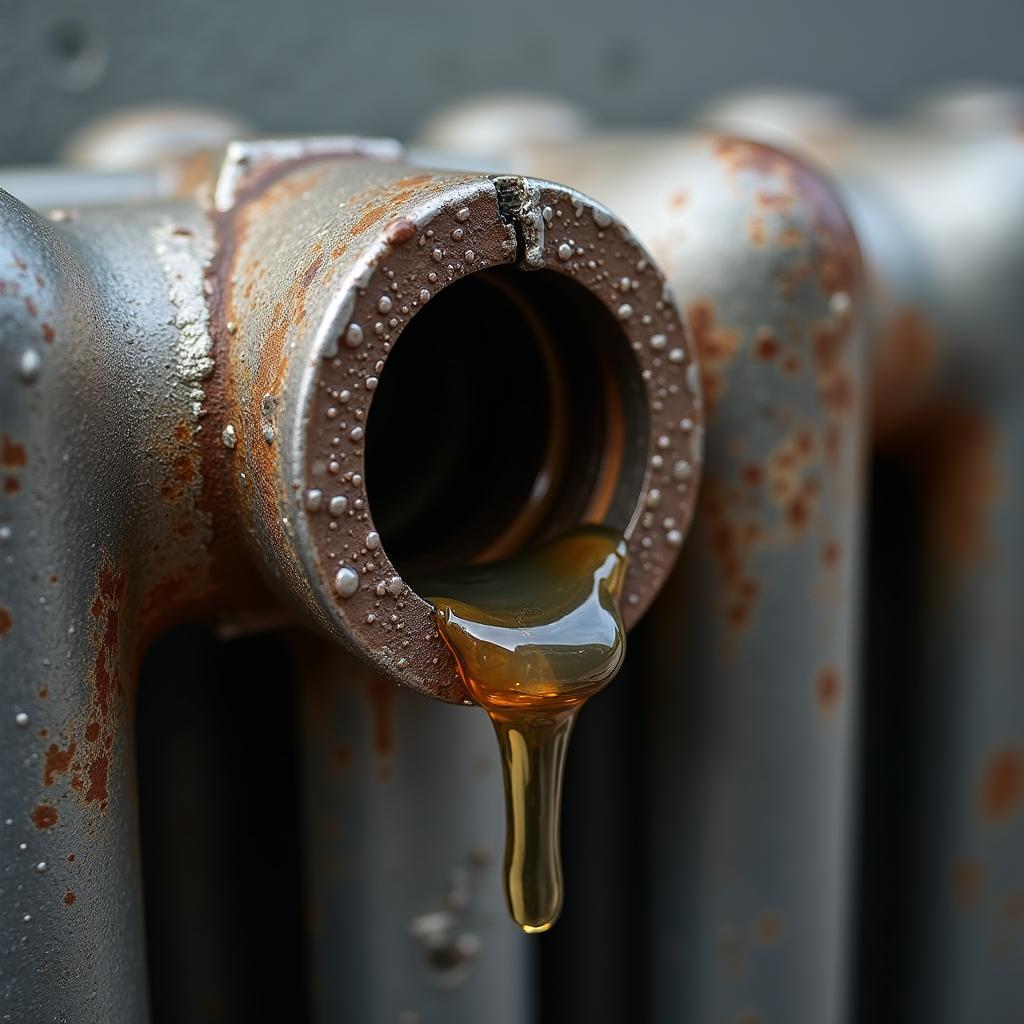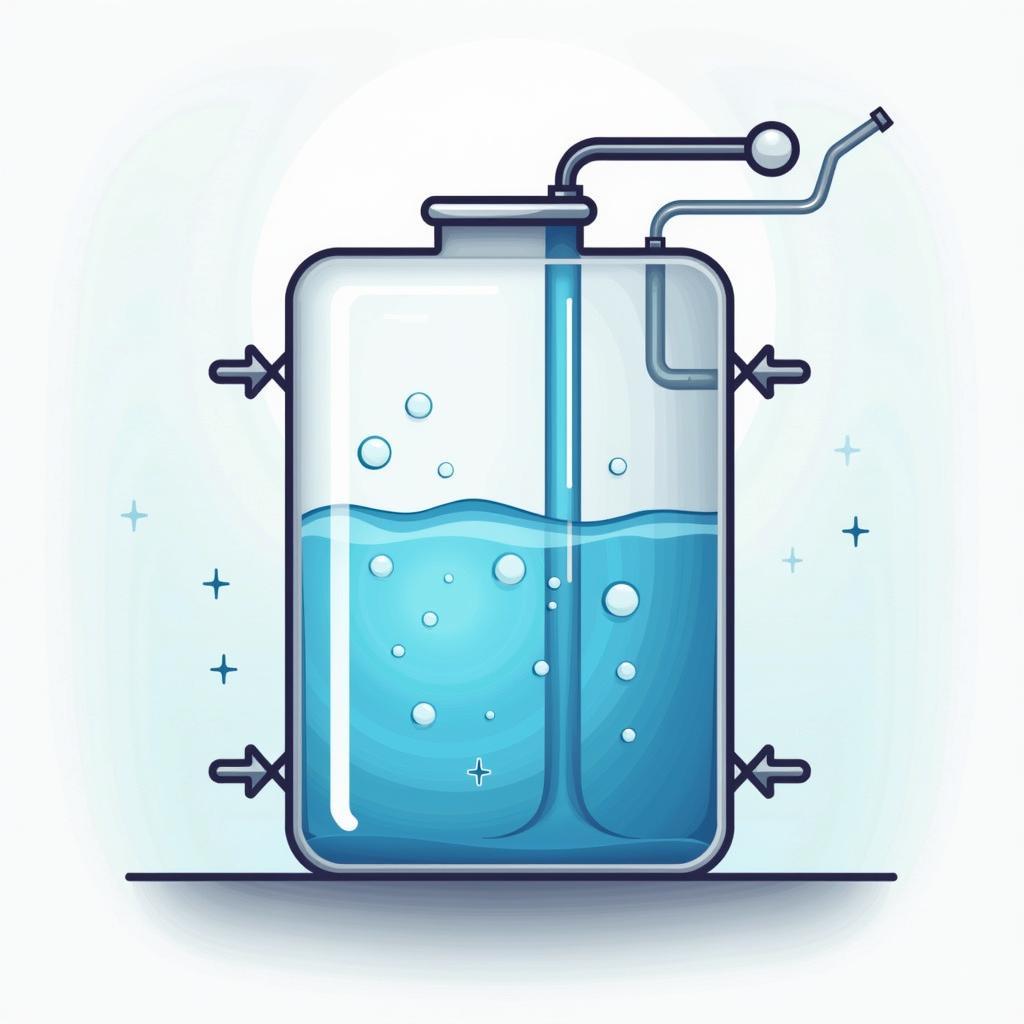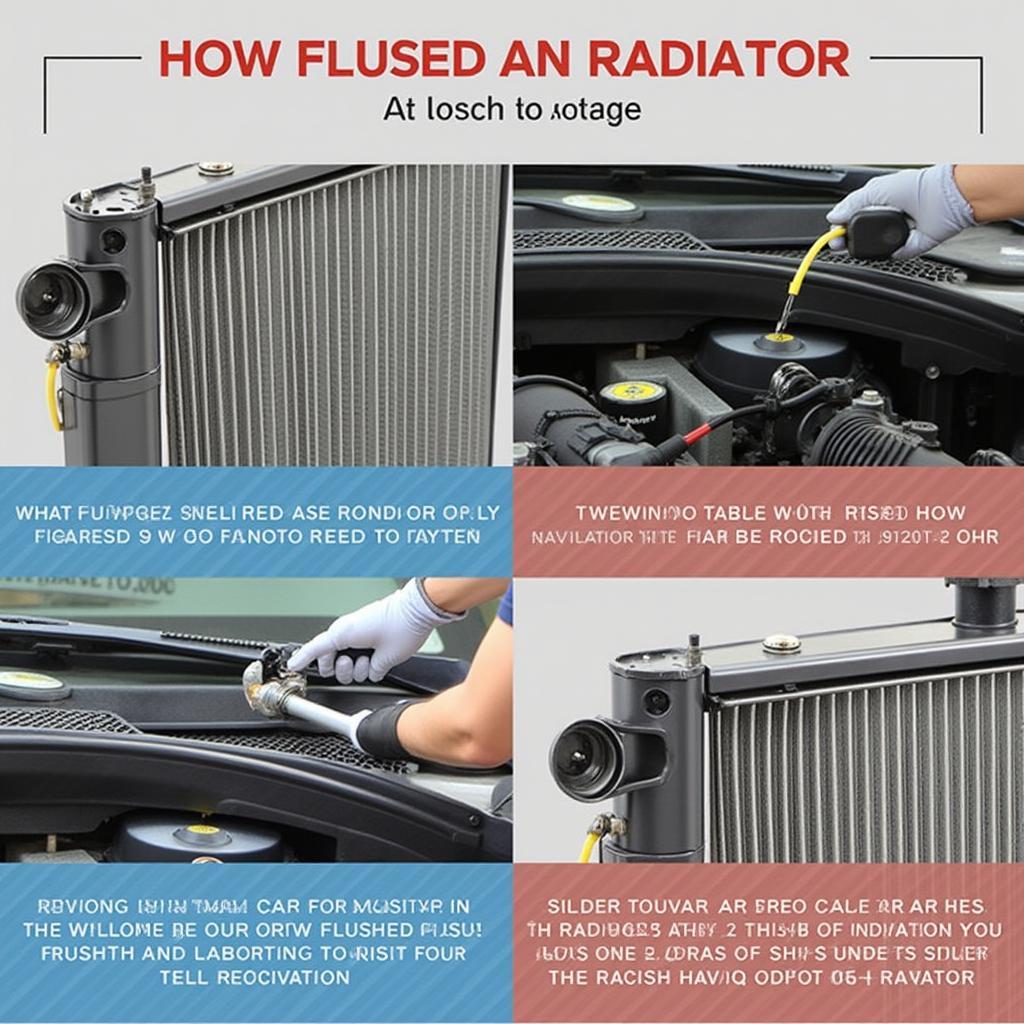Heat problems in a car can be a major inconvenience, especially during hot weather. If you’re experiencing issues with your car overheating, it’s important to understand the underlying causes and take appropriate steps to resolve the problem. This article will guide you through common heat problems, their symptoms, and effective solutions to keep your car running cool.
Causes of Heat Problems in a Car
A variety of factors can contribute to overheating in your car. Here are some common causes:
1. Radiator Issues:
- Radiator Leaks: Cracks or holes in the radiator can cause coolant to leak out, reducing the amount available to cool the engine.
 Signs of a leaking radiator
Signs of a leaking radiator - Clogged Radiator: Over time, dirt, debris, and corrosion can accumulate in the radiator, obstructing coolant flow and reducing cooling efficiency.
- Faulty Radiator Cap: A damaged or worn-out radiator cap can fail to maintain proper pressure within the cooling system, leading to boiling coolant and potential overheating.
2. Coolant Issues:
- Low Coolant Levels: Inadequate coolant levels can lead to insufficient heat dissipation.
 How to check coolant levels
How to check coolant levels - Contaminated Coolant: Dirt, oil, or other contaminants in the coolant can hinder its ability to transfer heat effectively.
- Incorrect Coolant Mix: Using the wrong type or mixture of coolant can compromise its cooling properties.
3. Thermostat Issues:
- Stuck Thermostat: A thermostat that’s stuck closed prevents coolant from circulating through the radiator, causing the engine to overheat.
- Faulty Thermostat: A malfunctioning thermostat can fail to regulate coolant flow properly, leading to temperature fluctuations and potential overheating.
4. Water Pump Problems:
- Failed Water Pump: A broken water pump prevents coolant from circulating through the engine, causing the engine to overheat rapidly.
5. Other Causes:
- Faulty Fan: An inoperative or malfunctioning cooling fan can’t effectively draw air through the radiator, leading to poor heat dissipation.
- Blocked Airflow: Obstructed air flow through the radiator, caused by debris or obstructions, can reduce cooling efficiency.
- Engine Overloading: Pushing the engine too hard, such as towing heavy loads or driving in hot weather, can increase the risk of overheating.
Symptoms of Heat Problems in a Car
Recognizing the signs of heat problems in your car is crucial for preventing severe engine damage. Here are some common symptoms:
1. Temperature Gauge Warning:
The most obvious indicator of overheating is a rising temperature gauge. If the gauge reaches the red zone, stop your car immediately to avoid further damage.
2. Steam or Smoke:
Overheating can cause coolant to boil, creating steam or smoke coming from the engine compartment.
3. Engine Knocking or Pinging:
Overheated engines can experience detonation or knocking sounds.
4. Coolant Leaks:
Visible coolant leaks under the car are a sign of a potential issue.
5. Engine Overheating Warning Light:
Modern cars come equipped with an engine overheating warning light, which illuminates if the engine temperature exceeds a safe threshold.
Solutions for Heat Problems in a Car
Once you’ve identified the underlying cause of the heat problems, you can take appropriate steps to resolve them. Here’s a breakdown of solutions for common issues:
1. Radiator Issues:
- Radiator Repair or Replacement: If your radiator has a leak or is damaged, you’ll need to repair or replace it.
- Radiator Flush: A radiator flush removes contaminants and debris, improving cooling efficiency.
 How to flush a radiator
How to flush a radiator
2. Coolant Issues:
- Top Off Coolant: Add the correct type and amount of coolant to restore proper levels.
- Coolant Flush: Flush the cooling system to remove contaminants and ensure proper coolant circulation.
- Coolant Replacement: Replace the coolant with a fresh mixture appropriate for your car’s make and model.
3. Thermostat Issues:
- Thermostat Replacement: If the thermostat is faulty or stuck, replace it with a new one.
4. Water Pump Problems:
- Water Pump Replacement: A failed water pump needs to be replaced.
5. Other Causes:
- Fan Repair or Replacement: Replace a faulty cooling fan.
- Air Flow Clearance: Remove any obstructions blocking airflow to the radiator.
Expert Insights:
“Regular maintenance and early detection are key to preventing heat problems in your car. Don’t ignore any warning signs. It’s better to address the issue proactively before it leads to more serious engine damage,” says John Smith, a certified automotive technician with over 15 years of experience.
Conclusion:
Heat problems in a car can be serious, but with proper understanding and attention to maintenance, they can be effectively addressed. By understanding the causes, symptoms, and solutions, you can keep your car running cool and prevent costly engine repairs. Remember, if you’re experiencing any heat-related issues, consult a qualified automotive technician for diagnosis and repair.
AutoTipPro can help with all your automotive needs!
Contact us today for a free consultation:
Phone: +1 (641) 206-8880
Address: 500 N St Mary’s St, San Antonio, TX 78205, United States
FAQ:
- What are the signs of a bad thermostat? A bad thermostat can cause fluctuating engine temperature, slow warm-up, and a feeling of sluggishness.
- How often should I flush my coolant? It’s generally recommended to flush your coolant every 2-3 years or 30,000 miles, depending on the type of coolant used.
- Can I use water instead of coolant? Water can be used in an emergency situation, but it’s not recommended for long-term use as it doesn’t provide the same level of protection as coolant.
- Why is my car overheating only when I’m driving? Overheating while driving can be caused by a variety of factors, including a malfunctioning cooling fan, low coolant levels, or a blocked radiator.
- Can I drive my car if it’s overheating? It’s not advisable to drive your car if it’s overheating. Stop the car immediately and let it cool down before attempting to diagnose the problem.
- How can I prevent my car from overheating? Regular maintenance, such as coolant flushes, fan checks, and radiator inspections, can help prevent overheating.
- What should I do if my car starts to overheat? If your car starts to overheat, pull over to a safe location and turn off the engine. Let the car cool down before attempting to diagnose the problem.





Leave a Reply